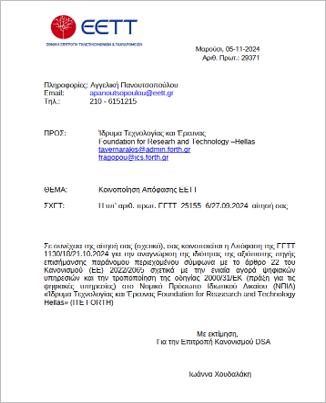by Meltini Christodoulaki and Paraskevi Fragopoulou (FORTH-ICS)
Under the Digital Services Act (DSA) [L1], lawmakers aim to tackle the spread of illegal internet content and to protect the fundamental rights of internet users, especially minors who use very large online platforms (VLOPs) and very large online search engines (VLOSEs). Safeline [L2], the Greek Hotline against illegal internet content, has been officially recognised as the first Trusted Flagger at national level in Greece, under the DSA.
SafeLine [1], the Greek hotline against illegal internet content, has operated since April 2003 by the Foundation for Research and Technology – Hellas (FORTH), Institute of Computer Science, and has been one of the three pillars of the Greek Safer Internet Center [L3]. The Greek Hotline has been an official member of INHOPE (www.inhope.org), the International Association of Internet Hotlines against illegal internet content, since October 2005. The number of reports received by SafeLine shows the importance of protection in the online environment. During 2024, the hotline received more than 8,000 reports for illegal content or behaviour online [2][3]. The hotline analysts who process the reports have been trained and certified by INHOPE and they are part of a huge network globally, able to exchange reports through the ICCAM database. ICCAM enables the secure exchange of illegal material portraying child sexual abuse between hotlines located in different jurisdictions, with the aim of quick removal from the internet. ICCAM also provides a service to hotlines worldwide to classify images and videos according to international standards (INTERPOL’s criteria) as well as national laws – all in one system [L4].
After so many years of operation, it was a great success that SafeLine was officially recognised as a “Trusted Flagger” in Greece under the Digital Services Act of the European Union. This important development comes to seal and recognize the 20-year action of the Greek hotline, which aims to combat illegal internet content, such as Child Sexual Abuse Material (CSAM), hate speech, online fraud, etc. This designation of SafeLine as a Trusted Flagger strengthens its ability to respond quickly and accurately for the identification and removal of the illegal content from the internet, and thus, contributes to the creation of a safe digital world for children and adults.
The Hellenic Telecommunications and Post Commission [L5], the Digital Services Coordinator in Greece approved the application of SafeLine to become a Trusted Flagger, according the decision shown in Figure 1.

Figure 1: SafeLine’s designation as Trusted Flagger by EETT, the Greek DSA national Coordinator.
What is a “Trusted Flagger”?
Trusted Flaggers are entities that, under the DSA, are recognized by European institutions for their reliability and specialized expertise in reporting illegal content. These organizations gain the privilege of having their reports handled directly by VLOPs and VLOSEs, such as social networks and search engines,so that reported illegal content can be removed from the internet more quickly and effectively.
The recognition of SafeLine.gr as a Trusted Flagger allows it to act more effectively, strengthening user protection and ensuring compliance with the rules of the DSA. Within this context, SafeLine works closely with the most popular online platforms, such as Meta (Facebook and Instagram), Google (YouTube, Google maps, etc.), Snapchat, X (previously Twitter), TikTok, Telegram, Discord, Redtube, Ponrhub, Youporn, Tube8, aliexpress, Dailymotion, eBay, etc. It is worth mentioning that the vast majority of the reports that SafeLine forwards to the aforementioned platforms, are processed within 24 to 72 hours and the illegal content is effectively removed from the internet.
What the Digital Services Act (DSA) provides in brief?
As stated in the EU guide, the Digital Services Act ensures that all digital services we use, especially the so-called “Very Large Online Platforms” such as Instagram, Snapchat, TikTok, and YouTube, and “Very Large Online Search Engines” such as Google or Bing, make greater efforts to protect users’ rights, safeguard our security, and limit the spread of illegal or harmful content.
The DSA requires online platforms to assess the impact of their services on key issues such as fair elections, public safety, users’ mental and physical well-being, and gender-based violence.
The DSA pays special attention to the protection of minors while they are online and obliges the online platforms to comply with the full set of the obligations under the DSA. Article 28 states that online platforms accessible to minors must ensure that their services provide a high level of privacy, safety, and protection for young users. More specifically:
- Platforms must adapt their systems to guarantee a high level of privacy, security, and safety for minors.
- Targeted advertising based on profiling children is strictly prohibited.
- Comprehensive risk assessments – including those addressing potential negative impacts on mental health – must be submitted to the Commission within four months of designation and published no later than one year afterwards.
- Platforms are required to redesign their services – such as interfaces, recommender systems, and terms and conditions – to effectively mitigate these risks.
Moreover, online platforms are obliged to implement measures to address risks associated with the dissemination of illegal content online, disinformation, as well as potential negative impacts on freedom of expression and access to information. Last but not least, platforms must provide users with a mechanism to report illegal content and ensure that such notifications are acted upon promptly.
Links:
[L1] https://commission.europa.eu/strategy-and-policy/priorities-2019-2024/europe-fit-digital-age/digital-services-act_en
[L2] https://www.safeline.gr/
[L3] https://saferinternet4kids.gr/
[L4] https://inhope.org/EN/articles/iccam-what-is-it-and-why-is-it-important
[L5] https://www.eett.gr/en/
[L6] https://eur-lex.europa.eu/eli/reg/2022/2065/oj/eng
References:
[1] Meltini Christodoulaki, Paraskevi Fragopoulou, SafeLine: reporting illegal internet content. Information Management & Computer Security 23 March 2010, 18(1): 54–65. https://doi.org/10.1108/09685221011035269
[2] Emmanouela Kokolaki, Evangelia Daskalaki, Katerina Psaroudaki, Meltini Christodoulaki, Paraskevi Fragopoulou. Investigating the dynamics of illegal online activity: The power of reporting, dark web, and related legislation. In Computer Law & Security Review Volume 38, September 2020, 105440. https://doi.org/10.1016/j.clsr.2020.105440
[3] Emmanouela Kokolaki, Paraskevi Fragopoulou. Unveiling AI's Threats to Child Protection: Regulatory efforts to Criminalize AI-Generated CSAM and Emerging Children's Rights Violations. https://doi.org/10.48550/arXiv.2503.00433
Please contact:
Meltini Christodoulaki
Foundation for Research and Technology-Hellas (FORTH), Greece
Paraskevi Fragopoulou
Foundation for Research and Technology-Hellas (FORTH), Greece










